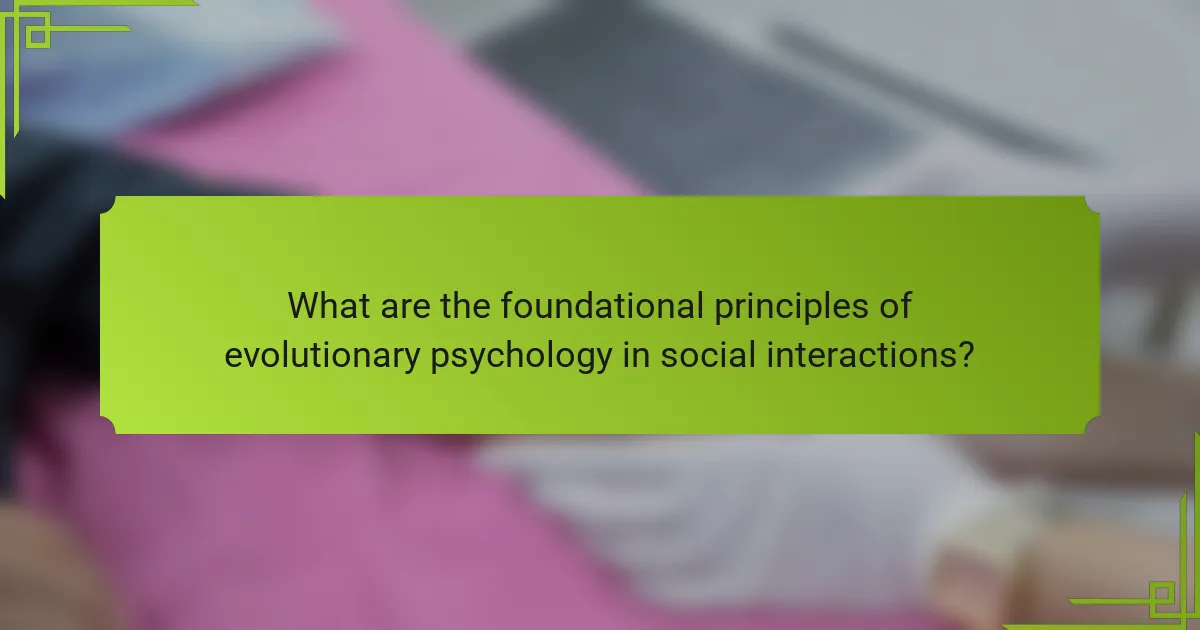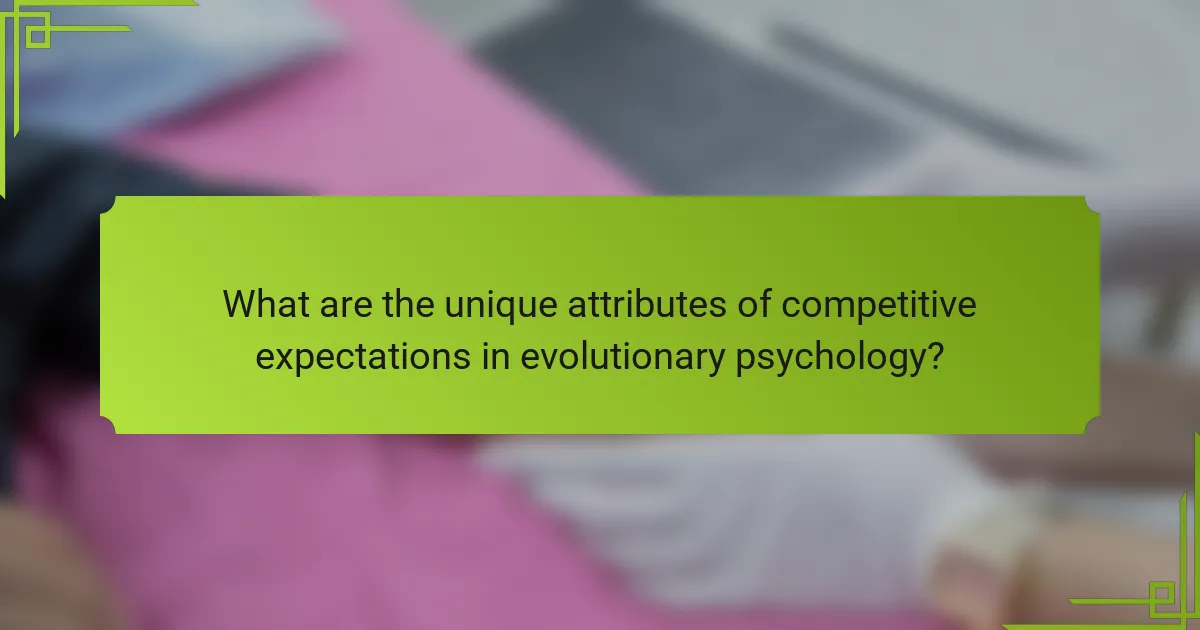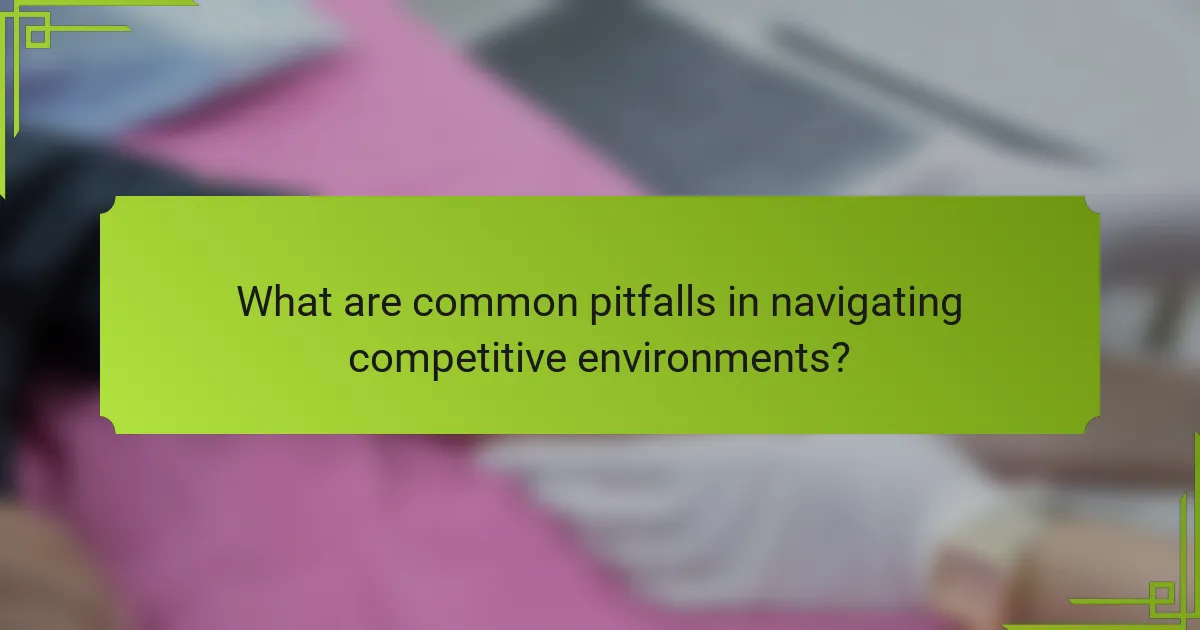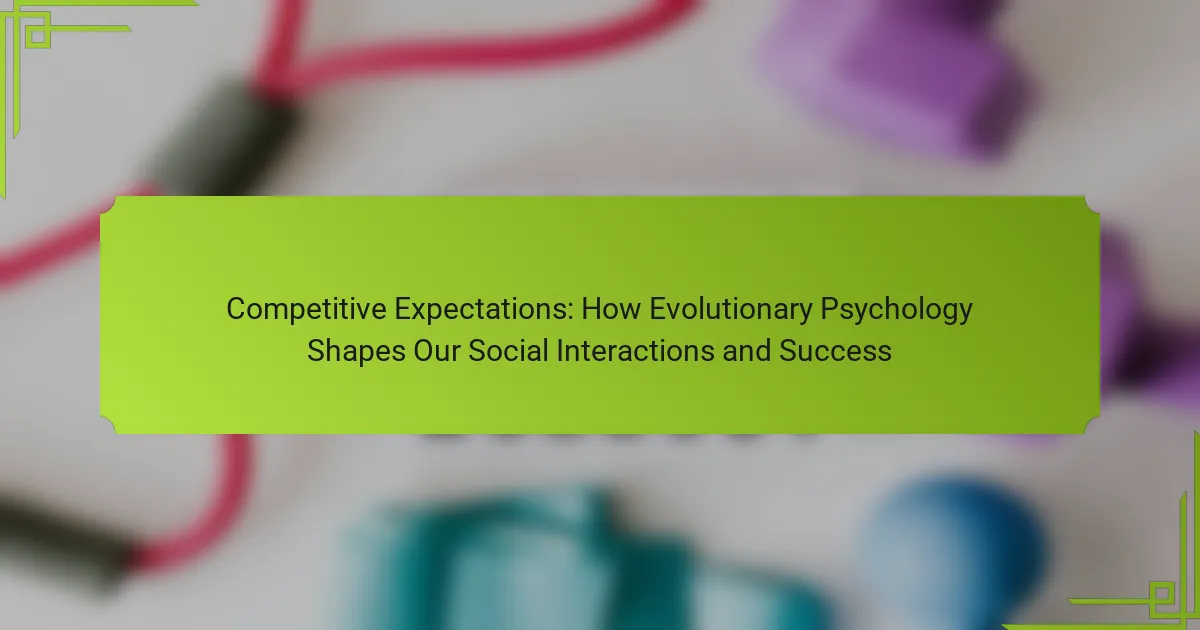Understanding how competitive expectations shape social interactions can enhance personal and professional success. Evolutionary psychology reveals principles like kin selection and reciprocal altruism that drive cooperation. Status and dominance influence social hierarchies, while mate selection affects partner choices. Recognising these dynamics is crucial for navigating competitive environments effectively.

What are the foundational principles of evolutionary psychology in social interactions?
Evolutionary psychology posits that competitive expectations significantly influence social interactions. These principles suggest that individuals are driven by innate behaviours shaped by evolutionary pressures, leading to strategies for social success.
One foundational principle is the concept of kin selection, where individuals prioritise relationships that enhance their genetic legacy. This affects social dynamics, fostering cooperation among relatives. Another principle is reciprocal altruism, where individuals engage in mutually beneficial exchanges, reinforcing social bonds.
Additionally, status and dominance play crucial roles. People often strive for higher social status, which can lead to increased access to resources and mates. This competitive drive shapes interactions, influencing behaviours like aggression and cooperation.
Finally, the principle of mate selection emphasises traits that signal genetic fitness. Preferences for certain characteristics can dictate social hierarchies and influence partner choices, further shaping social interactions.
How do competitive expectations influence human behaviour?
Competitive expectations significantly influence human behaviour by driving individuals to enhance their performance and social interactions. These expectations create a competitive environment that can lead to increased motivation, cooperation, or conflict. Research indicates that when individuals perceive competition, they often exhibit heightened effort and strategic thinking. For instance, studies show that competitive settings can improve cognitive performance and problem-solving abilities. Additionally, evolutionary psychology suggests that these behaviours stem from ancestral survival strategies, where competition for resources shaped social dynamics. Understanding these influences can help in various contexts, from workplace productivity to educational environments.
What role does natural selection play in shaping social dynamics?
Natural selection significantly influences social dynamics by shaping behaviours that enhance survival and reproduction. Individuals exhibiting traits that promote cooperation or competition often gain advantages in social settings. These traits can lead to improved social cohesion or dominance hierarchies, impacting group interactions. For instance, altruistic behaviour may enhance group survival, while competitive traits can drive personal success. Understanding these dynamics reveals how evolutionary psychology informs our social interactions and expectations.

What are the universal attributes of competitive expectations?
Competitive expectations universally revolve around social comparison, performance assessment, and outcome anticipation. These attributes shape interactions and drive behaviour in various contexts. Social comparison influences self-esteem and motivation. Performance assessment determines perceived competence relative to peers. Outcome anticipation affects decision-making and risk-taking. Understanding these attributes enhances personal and professional success.
How do competitive expectations manifest in various social settings?
Competitive expectations manifest in social settings through behaviours driven by status, comparison, and achievement. In group dynamics, individuals often gauge their performance against peers, influencing interactions. For instance, in competitive environments, such as workplaces or sports, individuals may exhibit heightened motivation and collaboration. These expectations can lead to both positive outcomes, like increased productivity, and negative effects, such as stress or conflict. Understanding these dynamics helps in navigating social interactions effectively.
What psychological mechanisms underpin competitive behaviours?
Competitive behaviours are driven by psychological mechanisms such as social comparison, status striving, and evolutionary instincts. These mechanisms foster a desire for dominance and success, influencing interactions. For example, social comparison theory suggests individuals evaluate their abilities relative to others, motivating competitive actions. Additionally, evolutionary psychology posits that competition enhances survival and reproductive success, shaping behaviours in social contexts. Understanding these mechanisms reveals the underlying motivations that drive competitiveness in various environments.

What are the unique attributes of competitive expectations in evolutionary psychology?
Competitive expectations in evolutionary psychology are shaped by unique attributes such as social comparison, adaptive behaviour, and resource allocation. These attributes influence how individuals assess their standing in social hierarchies and drive competition. Social comparison allows individuals to evaluate their abilities relative to peers, enhancing motivation and performance. Adaptive behaviour reflects the strategies developed to navigate social environments effectively, promoting success in securing mates and resources. Resource allocation involves the distribution of efforts based on perceived competitive advantages, optimising outcomes in social interactions.
How do environmental factors influence competitive expectations?
Environmental factors significantly shape competitive expectations by influencing perceptions and behaviours in social interactions. Factors such as cultural norms, economic conditions, and social dynamics affect how individuals assess competition and success. For example, in collectivist cultures, collaboration may be prioritised over individual competition, altering expectations. Additionally, environmental stressors like economic downturns can heighten competitive behaviours, as individuals strive for limited resources. Understanding these influences helps clarify why expectations vary across different contexts, highlighting the role of evolutionary psychology in shaping competitive dynamics.
What distinct patterns emerge in competitive scenarios?
Distinct patterns in competitive scenarios often reveal strategic behaviours driven by evolutionary psychology. Individuals exhibit heightened awareness of social hierarchies, leading to increased cooperation or rivalry based on perceived threats or advantages. For example, competitive environments foster adaptive strategies, such as forming alliances or displaying dominance. As a result, these patterns impact social interactions and overall success, highlighting the interplay between innate psychological drives and external competition.

What are the rare attributes of competitive expectations?
The rare attributes of competitive expectations include the influence of social status, the role of perceived scarcity, and the impact of evolutionary predispositions. These attributes shape how individuals assess competition and success in social interactions. Understanding these aspects can enhance strategies for personal and professional development.
How do cultural differences affect competitive expectations?
Cultural differences significantly shape competitive expectations by influencing communication styles, values, and social norms. For instance, collectivist cultures often prioritise group success over individual achievement, leading to different expectations in competitive scenarios. In contrast, individualistic cultures may emphasise personal accomplishment and assertiveness. These cultural frameworks affect how individuals perceive competition, negotiate, and collaborate, ultimately impacting their success in various environments. Understanding these dynamics enhances cross-cultural interactions and competitive strategies.
What unexpected outcomes arise from competitive interactions?
Competitive interactions can lead to unexpected outcomes such as increased innovation, heightened stress levels, and altered social dynamics. For instance, competition often drives individuals to enhance their problem-solving skills, resulting in innovative solutions. Conversely, it may induce stress and anxiety, impacting mental health. Additionally, competitive scenarios can shift social relationships, fostering alliances or rivalries that reshape group dynamics. These outcomes illustrate the complex interplay between competition and social behaviour shaped by evolutionary psychology.

How do competitive expectations impact success in personal and professional life?
Competitive expectations significantly influence success in both personal and professional life by driving motivation and shaping social interactions. Individuals often gauge their achievements against peers, fostering a competitive environment that encourages growth. This psychological framework can enhance performance, as people strive to meet or exceed the standards set by others.
Moreover, competitive expectations can lead to stress and anxiety if perceived standards become unattainable. Balancing ambition with realistic goals is crucial for sustainable success. Research indicates that those who manage their competitive drive effectively tend to experience greater satisfaction in their personal and professional relationships.
In summary, competitive expectations act as a double-edged sword, promoting achievement while necessitating careful management to avoid negative repercussions.
What strategies can enhance competitive advantage?
To enhance competitive advantage, organisations should leverage evolutionary psychology insights to optimise social interactions. Understanding human behaviour can improve team dynamics, foster collaboration, and drive innovation.
Strategies include cultivating a strong organisational culture that aligns with innate social motivations. Encouraging open communication and trust enhances employee engagement, leading to higher productivity. Implementing reward systems that recognise individual contributions can also motivate teams effectively.
Moreover, adapting to change by embracing flexibility in roles and responsibilities allows organisations to respond swiftly to market demands. Continuous learning and development opportunities empower employees, fostering a growth mindset that enhances overall performance.
Lastly, utilising data analytics to understand consumer behaviour can inform strategic decisions, positioning the organisation ahead of competitors. These approaches collectively strengthen competitive advantage by aligning organisational practices with fundamental human behaviours.
How can understanding competitive expectations improve social relationships?
Understanding competitive expectations enhances social relationships by fostering empathy and cooperation. By recognising how competition influences behaviours, individuals can navigate social dynamics more effectively. This awareness allows for improved communication, reducing misunderstandings and conflicts. As a result, relationships become more collaborative, leading to mutual support and shared success. Embracing this perspective can transform competitive scenarios into opportunities for connection and growth.

What are common pitfalls in navigating competitive environments?
Common pitfalls in competitive environments include overconfidence, misjudging rivals, and neglecting collaboration. These mistakes stem from evolutionary psychology, which influences our perceptions and interactions.
Overconfidence can lead to underestimating challenges, while misjudging rivals may result in ineffective strategies. Neglecting collaboration undermines potential alliances that could enhance success. Recognising these pitfalls allows individuals to navigate competitive landscapes more effectively.
What mistakes should individuals avoid in competitive situations?
Individuals should avoid overconfidence, misreading social cues, and neglecting teamwork in competitive situations. Overconfidence can lead to underestimating opponents, while misreading cues may result in poor strategic decisions. Neglecting teamwork undermines collective success, as collaboration often enhances competitive advantage. Recognising these pitfalls can improve outcomes in competitive environments.
How can one effectively manage stress related to competition?
To effectively manage stress related to competition, focus on preparation, mindfulness, and positive self-talk. Preparation builds confidence, reducing anxiety during competitive events. Mindfulness techniques, such as deep breathing or meditation, help maintain focus and calmness. Positive self-talk reinforces a growth mindset, fostering resilience against stress.

What actionable insights can be applied to leverage competitive expectations?
To leverage competitive expectations, focus on understanding social dynamics influenced by evolutionary psychology. Recognising innate human behaviours can enhance strategic interactions. For example, fostering trust and reciprocity can lead to stronger alliances. Additionally, adapting to competitors’ expectations can improve negotiation outcomes. Prioritise empathy and active listening to align with others’ perspectives, creating a collaborative environment.
What best practices can guide successful interactions in competitive contexts?
Successful interactions in competitive contexts rely on clear communication, mutual respect, and strategic collaboration. Establishing trust and understanding the motivations of others enhances outcomes. Active listening fosters connection, while maintaining a focus on common goals promotes synergy. Additionally, adapting behaviour based on situational cues can improve relational dynamics. Recognising and managing emotions, both personal and those of others, is key to navigating competitive environments effectively.
